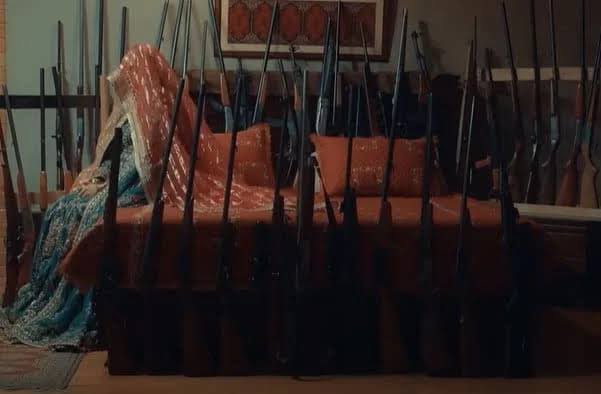Khaie’s Brutal Beauty – First week review!
– GLOSS ETC

There is a brutal beauty to Khaie, the drama helmed by Abdullah Kadwani and Asad Qureshi, which has just begun airing on Geo Entertainment. Director Wajahat Hussain’s camera spans over rugged landscapes, rigid peaks and cascading waterfalls. You are awed by the beauty but also unnerved by it. It is an unyielding terrain, breathtaking but also dangerous, emulating the characters living in the land.
There’s gunfire and talk of revenge from the first episode in – and you know that violence awaits. Saba Faisal, playing the family matriarch, warns of this as her family makes their way to their tribal home after fleeing from it years ago. And of course, the drama’s teasers indicate this too – you catch glimpses of blood, lifeless bodies falling to the ground and of a tearful bride, forced into marriage.
Taking center stage in Khaie is DureFishan Saleem as Zamdaa who returns to her tribal roots with her parents. Her father – enacted by Noor ul Hassan – hopes to resolve an age-old enmity and ensure a peaceful future for the younger generation of the region. Her mother – Saba Faisal – has doubts that the blood-feud could get settled simply through discussions. “You will be considered weak …” she warns her husband ominously at one point, also occasionally mentioning how the plant of khaie requires blood in order to bloom.
Forming the story’s backbone is the titular tribal practice of khaie, where one rival tribe finishes off the other by ending its entire male bloodline. Noor ul Hassan – Darwesh – wants peace but his enemies, led by Duraab Khan, enacted by Khalid Butt, and his sons including Channar Khan, played by Faysal Quraishi, would rather quench their bloodthirst. While Darwesh is shown discussing how he wants to bring about change in his area, Duraab and his sons are shown callously discussing death, revenge and the damages wreaked by education.
A bid for peace by Darwesh prompts Duraab to propose that their enmity get ended through marriage. He asks for Zamdaa’s hand in marriage for his son Channar Khan – who already has two wives, played by Laila Wasti and Uzma Hassan. The proposal comes with a veiled threat that should it not be accepted, Darwesh and his family would have to pay.


Alarmed, Zamdaa’s family decides to get her married immediately to her fiancé, Badal Khan, enacted by Osama Tahir. On the day of the wedding, Duraab Khan and his army arrive. In one portentous scene, Darwesh is seen dancing with his sons in celebration of the impending nuptials and he suddenly turns around to see a leering Duraab dancing right behind him. Darwesh’s expression changes as his wife’s words echo in his mind, that his talks of peace would be seen as a sign of weakness.
The events that then unfold – seen in the second episode of the drama – set the tone for the plot. Zamdaa, dressed in tribal bridal-wear, is happily getting photographed with her mother when gunfire rings through the air. She sees her brothers falling to their death, her father gunned down and as she and her mother wail over the bodies of the deceased, a ruthless Channar Khan bends down, removes her hand from her dead father’s, and takes her with him. It’s very scary, very violent.

And it could have been just another story based on tribal warfare had it not been for the narrative, spun with such expertise. 7th Sky Entertainment, well-known for going the extra mile to uplift a project and Wajahat Hussain, with his eye for details, have evidently gone all out. Drawing you in are the visuals: the towering traditional home in the backdrop, shining against the night sky, where Zamdaa’s parents discuss their plans; the picturesque bridge framed by towering rocky peaks where Zamdaa and her brothers pause with their cameras; Duraab Khan and his ruffians traveling in an entourage of cars which snake their way through roads overlooking high mountains and valleys; the customary tribal outfits and jewelry worn by Zamdaa and her family at the wedding. The beauty of Khaie’s story truly lies in the storytelling. And while the events of the first two episodes could be predicted easily, especially if one had seen the teasers, the drama still grips you with its depiction of stark evil.

The extensive ensemble of actors perform well, setting the stage for more impactful scenes that are expected to follow later. Faysal Quraishi is a pro at playing the malevolent anti-hero and Khalid Butt is exceptional as his evil father. DureFishan Saleem is refreshing, with her very natural acting which connects instantly. The drama also stars Shuja Asad, Nabeel Zuberi, Hasan Noman, Javed Jamal, Hina Bayat, Shamyl Khan and MaheNur Haider – its’s quite a lineup hinting at a story that’s bound to go through multiple twists and turns.
Also, there is hope that Saqlain Abbas’ script will now move into unconventional directions. The villains have now been identified but perhaps the women in this story will not be damsels in distress. One hopes to see Channar Khan’s wives, lead by the young Zamdaa, to get hold of the guns strewn about so carelessly in this tribal village and take on Channar Khan and his hateful father!

It is interesting to note here that while the story is clearly set in Pakistan’s northern regions, the exact location has not been identified. This is a clever move – a quick Google search reveals that the custom of khaie has reared its head now and again in the recent past but should the location have had been specified, it may have lead to certain ethnic groups taking offence. Even the styling and wardrobes of the actors are intrinsically tribal but not very specific.
A short discussion with director Wajahat Hussain confirms that the focus on the region’s rigid terrain is also deliberate. The undulating green hills of Punjab and Khyber Pakhtunkhwa are more serene while the rocky landscape of Gilgit – where the drama has apparently been shot – is far more imposing and jarring.
And Khaie, narrating a story seeped in blood, brutality and the thirst for revenge, fits right into the setting. The drama’s off to a smashing start. There’s also the promise of a different kind of narrative. One hopes that the promise rings true.
